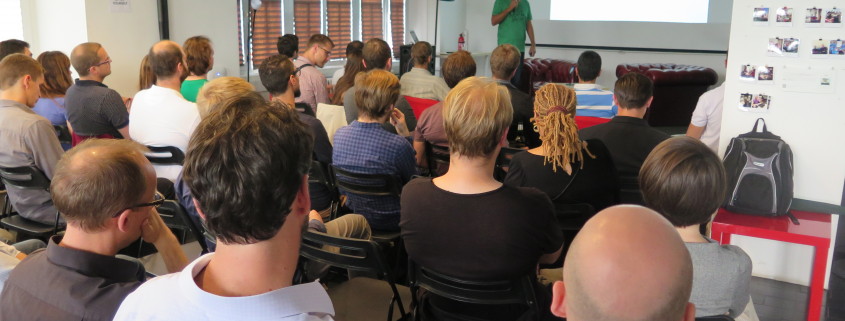6 Tips For Finalists at StartupYard
This week, StartupYard will welcome about 20 finalists for up to 10 positions in our 2016 cohort. They’ll spend a full day meeting with the StartupYard team, and a select group of mentors and investors from the StartupYard community.
This isn’t a competition, and it isn’t a job interview. We aren’t typical investors, and we aren’t employers either. We have a special relationship with all of our startups, and we have to make decisions quickly, but carefully.
So what are we looking for in our final finalists? Ultimately, we are looking for the smartest investments for StartupYard. That means teams that not only impress us with their vision and ambition, but that also offer us an opportunity to make as big as an impact as possible, so that their successes will be our successes too.
Today, we’ll share a few pieces of advice that we’ve come up with over the last few years, on how to navigate this process for the best result:
1. It’s Okay to Say “I Don’t Know.”
As we wrote about yesterday, being a credible leader doesn’t mean you have to have all the answers. If you do have all the answers, there’s a fair chance that some of your answers may not be the best ones possible.
Better that you should be able to say “I don’t know,” when faced with something you haven’t had the time or resources to address yet. Part of being a high growth company is not being able to predict every little thing you’ll have to do along the way. You can show you’re prepared, but you will never be able to convincingly show that you’ve figured out every step. If you had, you wouldn’t be talking to us anyway.
2. Acknowledge Challenges You Face
On a few occasions (thankfully never at StartupYard), I have had the displeasure of witnessing really poor mentoring and feedback on startup pitches.
The worst, and most useless kind of feedback goes like this:
“Well, I worked with a company that tried that, and it didn’t work. So, I don’t know. You’ve got a lot of challenges ahead.”
Duh. This can hardly be called feedback. But sadly, as a startuper, you’re going to hear it a lot.
There are going to be inherent challenges in your near and long term future. That’s a given. But it’s important to recognize, especially when talking to an investor or a mentor, the difference between useless feedback like that, and more serious questions:
“What are you going to do about x competitor?” Or, “Why would people would pay for this?”
A lot of founders get so used to being bludgeoned by stupid feedback, that they start to ignore legitimate concerns instead of acknowledging them. They’ll give bogus answers like “we are smarter than the competition,” rather than talking specifically about how they’re going to challenge a competitor. Or they’ll say: “we are going to work really hard to sell this,” instead of really answering the question, which is not about how hard they’ll work, but about what strategy they will use, and what opportunity they see in the market.
The fact that you have challenges ahead shouldn’t be news to anyone. But how you face those challenges says everything about how you’ll fare against them. You won’t overcome these challenges because of who you are, or how much you want to. You’ll overcome them by thinking about them, so start doing that first.
If you can show you understand what the challenges are, you will have a much easier time convincing us you can solve them.
3. Demonstrate Ambition
Arrogance is certainly a problem for many entrepreneurs, but it can be just as easy to make humility into a vice.
What we’ve found over the years, particularly with startups in Central Europe, is that they can be surprisingly shy about sharing their long-term, “big vision” ideas, because they are afraid that they will appear either stupid, or foolishly ambitious.
It’s not fun to listen to someone who can’t stop talking about their big vision and focus on the details, but it’s important that we do understand what your ambitions really are. What kind of company do you ultimately want to have? What position do you want to be in, in 5 years? It’s really ok for these ambitions to seem somewhat unrealistic. Again, if they were realistic at this moment, you wouldn’t need our help at all.
So don’t think we’ll laugh at you for wanting to be a worldwide leader- if that’s what you really want.
4 Talk Yourself Up
We just got done saying that you shouldn’t be shy about your ambition. You also shouldn’t be shy about your accomplishments.
Last year, as we were working on the Demo Day pitch for one of our startups, the founder was having trouble with what he wanted to say about the team. He couldn’t come up with a convincing argument for why they were the right people to solve a complicated problem on the market.
As it turned out, and as the founder had never shared with us previously, he just happened to have previously worked for companies who needed to calculate orbits and fuel usage for satellites in Earth orbit- he helped those satellites in the sky.
So, in other words, he was a rocket scientist.
And he was someone who was having trouble articulating why it was that he was qualified to take on complicated problems.
I don’t think many reasonable people would think he was being arrogant for mentioning that qualification to investors. But I’ve been consistently surprised by startup founders who do fail to mention important details about themselves and their qualifications.
That’s admirable, that these people choose let their work speak for itself, but if you’ve earned a little bit of respect for what you’ve done in the past, by all means, use it!
5. Ask Questions
This process is not just about us picking favorites. It’s also about you deciding what’s best for your company, and your own future. We don’t know what you don’t know, and since we assume we’re dealing with pretty smart people , we don’t always tell you everything you might want to know.
So ask us. And judge us on our answers. That’s only fair. Our reputation has to be built on our transparency and honesty with startups. If we don’t have that, we don’t have much.
6. Don’t Sell: We Aren’t your Customers
This advice goes back what we said yesterday about “trying too hard.” You have to acknowledge challenges, and talk yourself up, but if you aren’t careful, doing all those things at once can put you right into “salesman mode.”
Pretty soon you’re “acknowledging challenges,” before they’re even brought up, and talking yourself up when you don’t really need to. Your ability to sell is important, but we aren’t your customers.
The unvarnished truth, or at least something closer to the unvarnished truth, is important to investors in making the right decisions- not just for them, but also for you. As I often tell startups: you can sell anybody something they don’t need or want, but only once. After that, you’ll never be able to sell to them again. But if you find the right “customer,” or the right investor, you can develop a lasting relationship.
So don’t treat us like a customer. We aren’t buying anything.






